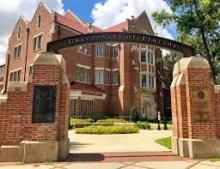
Rest in peace, academic freedom, because the University of Florida has decided faculty members may speak their minds only when it’s in the best interests of the Gators and the governor.
In effect, that means no university-sanctioned criticism of state government, its laws or the GOP leaders who make them.
In a stunning revelation Friday, The New York Times reported that UF was prohibiting three professors from working with plaintiffs who filed a lawsuit challenging Florida’s new voting restrictions.
The decision may be unprecedented, and it represents an about-face for a university that in 2018 cleared a professor to work on previous election lawsuits. One of those, ironically, was a lawsuit that challenged the state’s unconstitutional ban on early voting sites at state university campuses.
Between this latest decision and revelations that UF greased the hiring of Dr. Joseph Ladapo because he was about to get appointed as surgeon general, the University of Florida is looking more like a political toady than an independent academic institution.
If UF values its place among the nation’s leading universities — and if it expects to attract faculty members who value their independence — it will reverse this embarrassing decision and free professors to pursue outside work regardless of whether it might anger powerful and vindictive politicians. The accrediting body for UF already is planning an investigation into the university’s actions, according to the Chronicle of Higher Education.
Three university political science professors — department Chair Daniel Smith, Michael McDonald and Sharon Austin — were told their independent participation in the lawsuits represented a conflict of interest. In Smith’s case, the dean of arts and sciences wrote that there was a “conflict of interest to the executive branch of the state of Florida..”
That’s absurd. Based on that reasoning, we should conclude that the university would clear professors to defend the state, but not challenge it. Has this state’s flagship university really sunk to the level of becoming a mouthpiece for the executive branch of Florida government?
What’s even more absurd is that the work those professors sought to do doesn’t come close to meeting UF’s own definition of a conflict of interest, which its handbook says “occurs when a University Employee’s financial, professional, commercial or personal interests or activities outside of the University affects, or appears to affect, their professional judgment or obligations to the University.”
By any reasonable reading, serving as an expert, on their own time, in a lawsuit that challenges state election law, doesn’t meet that standard. It’s not in the same galaxy.
Florida’s response was insipid and disingenuous: “The University of Florida has a long track record of supporting free speech and our faculty’s academic freedom, and we will continue to do so.”
The university said it simply denied them permission to accept paid outside work that was “adverse to the university’s interests as a state of Florida institution.”
How exactly is testifying on behalf of an elections lawsuit adverse to the university’s interests? Because it might annoy the governor or legislative leaders? Has it really come to that?
“It’s really quite breathtaking, and a complete reversal from the green light that the UF administration has always given me to promote the voting rights of all Floridians,” Smith wrote in a statement.
“I refuse to teach my students that it is important to fight for voting and civil rights and then not fight for those rights myself,” Austin wrote.
“Last minute costume change this year: I’m going as an academic exercising their free speech. Very scary to some folks, apparently,” McDonald sardonically tweeted on Halloween.
We’d like to know what the Gov. Ron DeSantis thinks. He did, after all, lead the charge to pass a law earlier this year punishing social media platforms that didn’t let users say whatever they pleased. After all his yammering about censorship, the governor surely can’t believe that what UF is done isn’t worse, particularly since the university is a government institution restricting speech, not a business.
This is the second time in a week that the University of Florida has stepped in a big pile of poo.
The Gainesville Sun busted UF after obtaining emails that showed the university — aided by the chairman of UF Board of Trustees, GOP megadonor and DeSantis supporter/adviser Mori Hosseini — worked furiously to get Ladapo hired ahead of the announcement that he was about to be appointed as Florida’s surgeon general.
In other words, Ladapo’s appointment as a tenured UF professor looks like it was just as politically motivated as his appointment to become surgeon general at an inflated pay rate.
Which should have everyone wondering: If the governor had a hand in getting Ladapo a job at UF, was he also involved in silencing the professors who dared to challenge one of his signature bills — a new crackdown on voting rights?
The University of Florida’s reputation as an institution that values truth is going to sustain lasting damage if it doesn’t reverse this disastrous decision to silence its professors because of politics.
Editorials are the opinion of the Orlando Sentinel Editorial Board and are written by one of our members or a designee. The editorial board consists of Opinion Editor Mike Lafferty, Jennifer A. Marcial Ocasio, Jay Reddick and Editor-in-Chief Julie Anderson. Send emails to insight@orlandosentinel.com.
